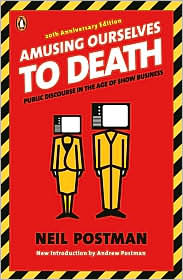
The subtitle to this book, while lacking the title's shock value, is probably a little more relevant: Public Discourse in the Age of Show Business. Postman's book, published in 1985, details the way in which television affects American culture, as America is the leading producer/consumer of television. A comparison made throughout warns that we are not likely to have our culture destroyed by Orwell's Big Brother, which would have to be forced on us, but by Huxley's soma, which would choose and adore.
The theme of the book is that the way information is transmitted affects the information itself, as well as the society in which it is transmitted. The printed word, for example, lends itself to lengthier discourse, so that the person writing it is required to make a well-supported argument and the person reading it must examine and consider that argument. Information had to be relevant, important, and subjected to at least some basic form of logic. With the telegraph, however, information did not have to be relevant, it simply had to be there. News could travel from Maine to Texas almost instantly; nevermind that people in Texas didn't really need to know what was happening in Maine. It wasn't relevant to their lives.
Jump to television, which takes the same idea of instantaneous, around-the-world information and makes it available 24 hours a day. Bookended by thrilling music and read by attractive people, the news has very little to do with your life other than the entertainment it provides in between commercials. According to Postman, TV programming is our main source of public discourse, and it doesn't need to answer to logic, relevance, or even importance.
I largely agree with Postman's views. TV is our society's primary source of discourse, and this has certainly led to a mentality that demands that something- anything- be entertaining above all else. Tackled specifically in the book are news, politics, education, and religion. I found myself nodding with Postman's assessments, sometimes realizing that I had often thought or felt the same thing myself.
I ranted previously that televisions are everywhere. I think now that, more specifically, my gripe wasn't with the box itself, but the fact that we want it to be there. We think it's necessary. There's almost a sense of, "What else is there?"
Over the last few days, I've been trying to apply Postman's ideas to a younger form of discourse: the Internet.* The Internet, of course, laughs at relevance and logic is reduced to a few scattered rants in user forums and (gulp) blogs that no one need ever read, much less consider seriously. But I think that the Internet, while no angel, is different than television rather than an exaggeration of it. For one thing, it's so big- it can be anything. When people choose their own irrelevant information, does that create some sort of relevance in itself? And is the prerequisite of entertainment sustained on the Internet as it has been on the TV screen? If not, what prerequisites are there for information on the Internet? That is, how does the medium of Internet affect the information it transmits?
One example I've thought about in the past is the idea of online classes, and how popular they seem to be becoming. I think the breaking point for me were Public Speaking and Spanish classes offered online. Postman notes that to change the medium of information without expecting the information itself to transform is ridiculous. Ask just about anyone who's seen the movie version of their favorite novel. And can the Internet be a classroom? When a teacher is in a classroom, he expects to teach. A student expects to learn. What each actually does may vary, but there is little doubt as to the intention of the entire process.
Q: What do you do in a classroom? A: I go to class, that's all.
Q: What do you do online? A: Anything I want.
These are a few brief points that have interested me for a while and were illuminated in "Amusing Ourselves to Death". If this entry is scattered and long, it's because I've been thinking, and will continue to think, about the ideas in this book. I suppose that's the point, after all.
* - I hereby suspend any and all irony related to the nature of critiquing the Internet on a blog.
1 comment:
This flows nicely into my recurring obsession with quantity and quality of information which by their very nature must have an inverse relationship. We receive more information now than ever before. A video on criticalthinking.org claims that one week's worth of New York Times contains more information than an average person would have encountered in their lifetime 100 years ago.
We have access to more knowledge (more like we are bombarded with more knowledge), but no time to verify or analyze that information. There's too much to process, so we process nothing?
And as for online classes, I'm looking forward to the day when we teach interpersonal communication online. :)
Post a Comment